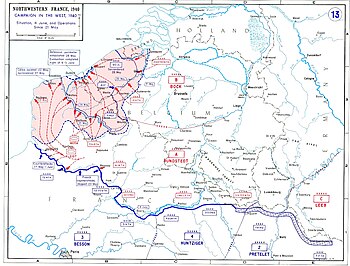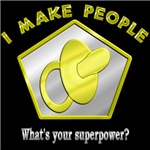June 25th, 2007
Digg this
The Announcement
in 1999, King Arthur II paid a visit to his estranged wife, Queen Gwen, in her cell. “To what do I owe the honor?” Her sarcastic question brought a small smile to his lips, and she shrank back on her cell's cot from him. “For an agent of our enemies, you have led our country surprisingly well in the war, my queen. I was wondering about that.” She looked out the bars at Sir Lance standing a dour guard and replied, “With you safely ensconced in a hospital bed, my king, this was my country. For the first time in my life, I knew what it was to feel a sense of pride in one's nation. Our triumph had become my triumph. So close to ultimate victory, I couldn't let our warriors suddenly collapse as the Illuminati ordered. My kingdom demanded the destruction of the Central European Empire, and I obliged them.” Arthur leaned in close, his beard brushing her cheek, and whispered in her ear, “And the fact that it would make you the world's most powerful ruler was just a side benefit, eh?” She rubbed her cheek against his while locking eyes with du Lac and said, “No, that was the main motivation for me. But, in this instance, the kingdom's interests and mine coincided. I want to rule the world, and Great Britain is the tool which will allow me to do it.” She kissed him lightly on the cheek and he pulled away. “How did you break my hold on Lance, by the way? That was very impressive.” Arthur walked back to his knight's side. “Some loyalties will shine through no matter what they've been temporarily submerged by.” She nodded, an enigmatic smile on her face, and said, “That is so true.”
In 1949, a country gathering of the power elite who brokered the Carthaginian peace deal with Oswald Mosley is thrown into turmoil when the main negotiator, Rudolph Hess, is murdered, with a yellow star pinned to his chest with a dagger. The author of Mark Jo Walton deftly alternates perspective between the host's daughter, who has disgraced herself in her family's eyes by marrying a Jew, and the Police Inspector Heinrich Himmler, who quickly suspects that the killer is not a Bolshevik terrorist. |
~ variant from Steve Payne: extensive use of original content has been made to celebrate the author's genius.
| In 1588, King Philip of Spain confirmed that Álvaro de Bazán, 1st Marquis of Santa Cruz and not the less experienced Duke of Medina Sidona would after all command the Spanish Armada. Santa Cruz had been seriously ill since Francis Drake burnt the Spanish ships at Cádiz in 1587, and the King's unjustified reproach was said to have seriously affected his health. So much so, that in February of 1588 it was feared that he would die, Sidona was appointed and several ships of the Spanish Navy were named Álvaro de Bazán in his honour. When news of Santa Cruz recovery reached Plymouth, a shiver of fear ran through the English High Command. |
| In 2315, or Change+1 day the now unmechanized world of men struggled to adapt to the Change. Electricity and pressurized gases were rendered unusable, as the basic mechanics of civilization had ceased to operate. The alteration of the human condition was so significant that a more insidious change was unnoticed for some time. Man himself had become a supernatural being, physical changes followed - the Magic Time had begun. | |
| ~ variant from Steve Payne: extensive use of original content has been made to celebrate both of the author's genius. | |
 Mei | In 1761, in Iran (Persia), mei (the Persian wine) had been a central theme of their poetry for more than a thousand years, although alcohol was strictly forbidden in Islam. |
~ entry by Steve Payne from Counter History in Context - You're the Judge! | |
| In 1950, today saw the beginning of the Korean War. The impetus was twentieth century attempts to expel the European from AsiaPac as irreversible historical processes played out in the Far East. The exit of Colonial powers had created a power vacuum filled by Japan, China and the United States. The decision to detonate nuclear .. |  Korean War |
| .. weapons in Japan had convinced China that the United States would not [in the words of Bernard Montgomery] “Send their land army to Asia”. This might have been the case had not General Douglas MacArthur won the 1952 Presidency. Having been expelled from Manilla, he had absolutely no tolerance for defeat in the Far East. As the war spread into Indochina, MacArthur continued to escalate. His restoration of Chiang Kai-shek's government in Beijing brought regional stability and secured the American century. His predecessor Harry Truman's decision to treat the conflict as a limited, proxy war was demonstrated for the folly it was, fast on the heels of his loss of China in 1948. Perversely, Truman's dismissal of MacArthur as military commander in Korea forced a decision by encouraging Brass Hat to chase for the White House. There was indeed no substitute for victory. | |
~ entry by Steve Payne from Counter History in Context - You're the Judge! | |
 Little BigHorn | In 1876, a brutal massacre occurred on this day in the eastern Montana Territory. Lieutenant Colonel George Armstrong Custer defeated Sitting Bull and Crazy Horse in their Land Stand near the Little Bighorn River. In winning this armed engagement between a Lakota-Northern Cheyenne combined force and the 7th Cavalry of the .. |
| .. United States Army, Custer established heroic status in the US Military. Commanders such as “Black Jack” Pershing were still listening to the story with awe when their septuagenarian boss led the US Expeditionary Force to France in 1916 | |
~ entry by Steve Payne from Counter History in Context - You're the Judge! | |
| In 1940, on this day Nazi Germany formally surrendered to the Anglo-French Union. Shortly after the visit of King George to France, Sir Winston Churchill gave a speech proposing a Federal Union between France and Britain. The proposal was accepted and on 21st May their joint forces executed the Weygand .. |  Weygand Plan |
| .. Plan. The German armoured spearhead was pinched off by combined attacks from the north and the south, crushing von Kleist's two Panzer Corps. In a startling and unexpected result, the Union emerged from the Battle of France as the world's first superpower. | |
~ entry by Steve Payne from Counter History in Context - You're the Judge! | |
Cool stuff - Let us know where you are on Frappr! and We've been Dugg
We have links again! Yay, us. Check them out on the side of the page, and if you have some suggestions, send them to us!
Visit the Co-Historian's store -



No comments:
Post a Comment